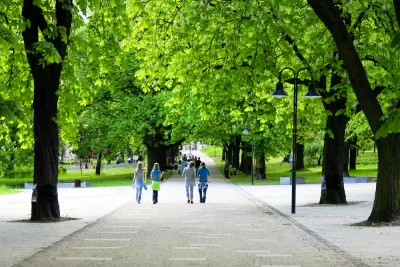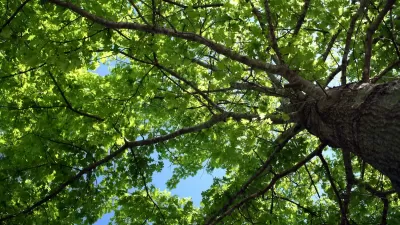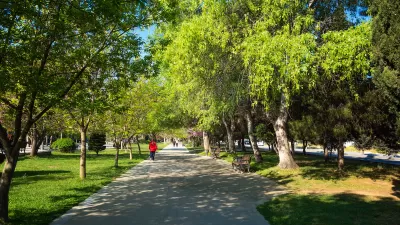Ambitious campaigns to plant trees in urban areas often don't take into account the complexities of growing and maintaining effective urban forests.

Around the world, pledges to plant more trees in cities have taken off as a perceived "feel-good cure-all for global warming. In the U.S., conservative leaders like former President Donald Trump have touted tree-planting while working to eliminate emissions regulations." But the reality of planting trees is more complicated, write Feargus O'Sullivan and Linda Poon.
"Popular campaigns to plant 1 million trees are announced to much fanfare in cities from London to Los Angeles to Phoenix, Arizona, but often fall short of their goals. Many trees don’t survive, or thrive, or deliver their promised benefits." Although "[t]here is good reason for the enthusiasm around planting trees," including carbon storage and their ability to mitigate the effects of urban heat islands and pollution, "planting a massive number of trees is not necessarily a positive investment if not enough of them survive to become mature plants." Tree planting also comes with its own carbon cost, "meaning that trees have to survive years before they offset that cost. The largest environmental gain comes when trees mature, sometimes decades after they’re planted."
The article details the lackluster performances of programs in Copenhagen and Los Angeles, where tree planting efforts ran up against a variety of unexpected challenges. According to U.S. Forest Service researcher Lara Roman,"[i]t’s not just about planting a million trees. It’s about planting and taking care of a million, and in the right places." For example, "non-native species can be the best choices in cities, where intense human activity has to an extent estranged climates from their broader surroundings."
"That’s why if cities really want to measure the success of their tree programs, they need to factor in the maturity and types of trees" by measuring tree canopy and planting diverse, resilient species.
FULL STORY: The Darker Side of Tree-Planting Pledges

Planetizen Federal Action Tracker
A weekly monitor of how Trump’s orders and actions are impacting planners and planning in America.

Chicago’s Ghost Rails
Just beneath the surface of the modern city lie the remnants of its expansive early 20th-century streetcar system.

San Antonio and Austin are Fusing Into one Massive Megaregion
The region spanning the two central Texas cities is growing fast, posing challenges for local infrastructure and water supplies.

Since Zion's Shuttles Went Electric “The Smog is Gone”
Visitors to Zion National Park can enjoy the canyon via the nation’s first fully electric park shuttle system.

Trump Distributing DOT Safety Funds at 1/10 Rate of Biden
Funds for Safe Streets and other transportation safety and equity programs are being held up by administrative reviews and conflicts with the Trump administration’s priorities.

German Cities Subsidize Taxis for Women Amid Wave of Violence
Free or low-cost taxi rides can help women navigate cities more safely, but critics say the programs don't address the root causes of violence against women.
Urban Design for Planners 1: Software Tools
This six-course series explores essential urban design concepts using open source software and equips planners with the tools they need to participate fully in the urban design process.
Planning for Universal Design
Learn the tools for implementing Universal Design in planning regulations.
planning NEXT
Appalachian Highlands Housing Partners
Mpact (founded as Rail~Volution)
City of Camden Redevelopment Agency
City of Astoria
City of Portland
City of Laramie





























